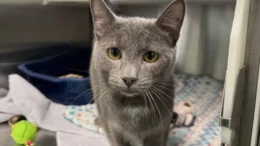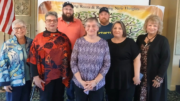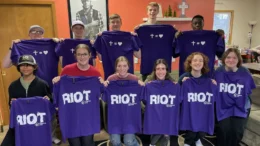Suicide is the 11th leading cause of death in Pennsylvania, and Clarion County is not immune from the rising rate across the state.
The county’s suicide rate doubled in one year, from five in 2017 to 10 in 2018.
“Suicide is preventable,” said David Delvaux, a volunteer with the Clarion County Coalition for Suicide Prevention. “Each one of us can help prevent suicide,” he told an audience during a community awareness night forum Tuesday at the Knox fire hall.
— Talking about wanting to die or kill oneself
— Looking for ways to kill oneself; such as searching online or buying a gun
— Talking about feeling trapped or being in unbearable pain
— Talking about being a burden to others
— Increasing the use of alcohol or drugs
— Acting anxious or agitated, or behaving recklessly
— Sleeping too little or too much
— Withdrawing or feeling isolated
— Showing rage or talking about seeking revenge
— Displaying extreme mood swings
Delvaux, who is employed at the Clarion Psychiatric Center, dispelled several myths about suicide. He said one misconception is that only professional counselors can prevent a suicide.
“Anyone can prevent a suicide,” he said. “You should take any threat seriously. Tell the person you are concerned. Help them to see the big picture. Often they have a very limited view of their situation.”
He also said that if a person actually has a plan to commit suicide, the person should never be left alone. All guns or sharp objects should be removed.
“And get help as soon as possible,” he said.
“We have counselors mobiling out,” she said. “We are within 30 minutes to an hour from anywhere in Clarion County. We can come to where you are.”
Shaffer said that during the school year, most of the calls Crisis receives are from schools.
“We work closely with the schools’ student assistance program,” said Shaffer. “If there is a problem we will keep circling back. If we need to we will knock on doors. We will make our counselors available.”
Delvaux said “kids make suicide pacts with one another. In Indiana County we lost four people that way.”
“This is a public health crisis,” said Shaffer. “Most people really don’t want to die. They see suicide as the only way to end the pain.”
Janet Mangel, a volunteer with the suicide prevention coalition, said Crisis is also available for a “postvention.”
“We can provide help following any death, not just a suicide. The Crisis outreach team can also help dealing with loss after a natural disaster,” Mangel said.
“You need to be our eyes and ears,” Mangel added. “We can’t be everywhere.”
Crisis added a text service recently and the number is 63288. The telephone number for Crisis is (814) 226-7223.






































